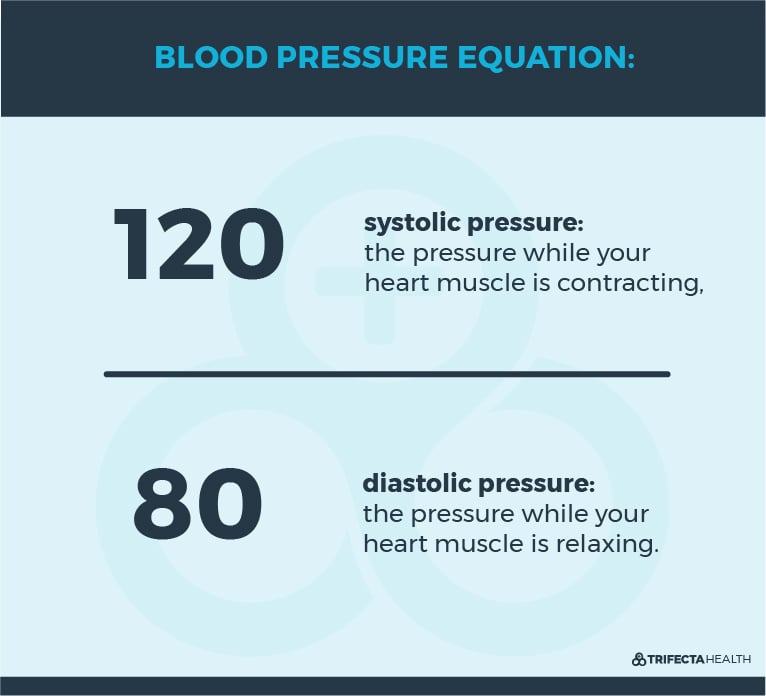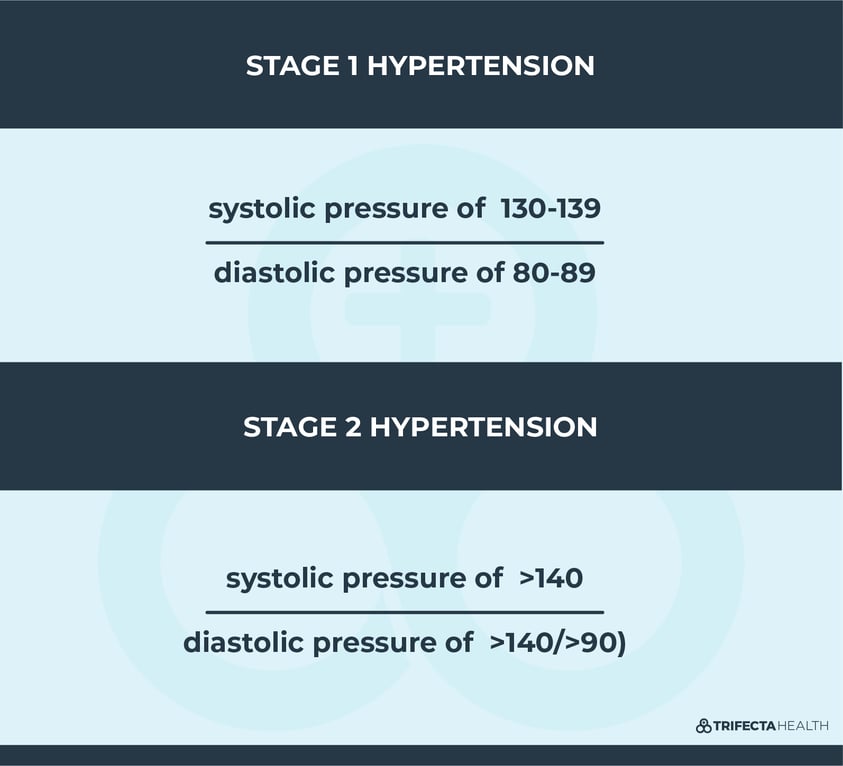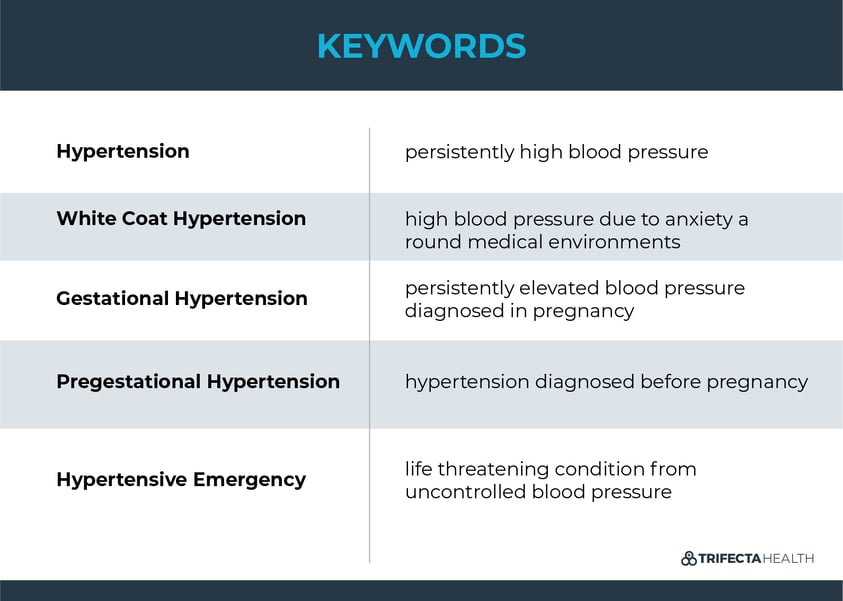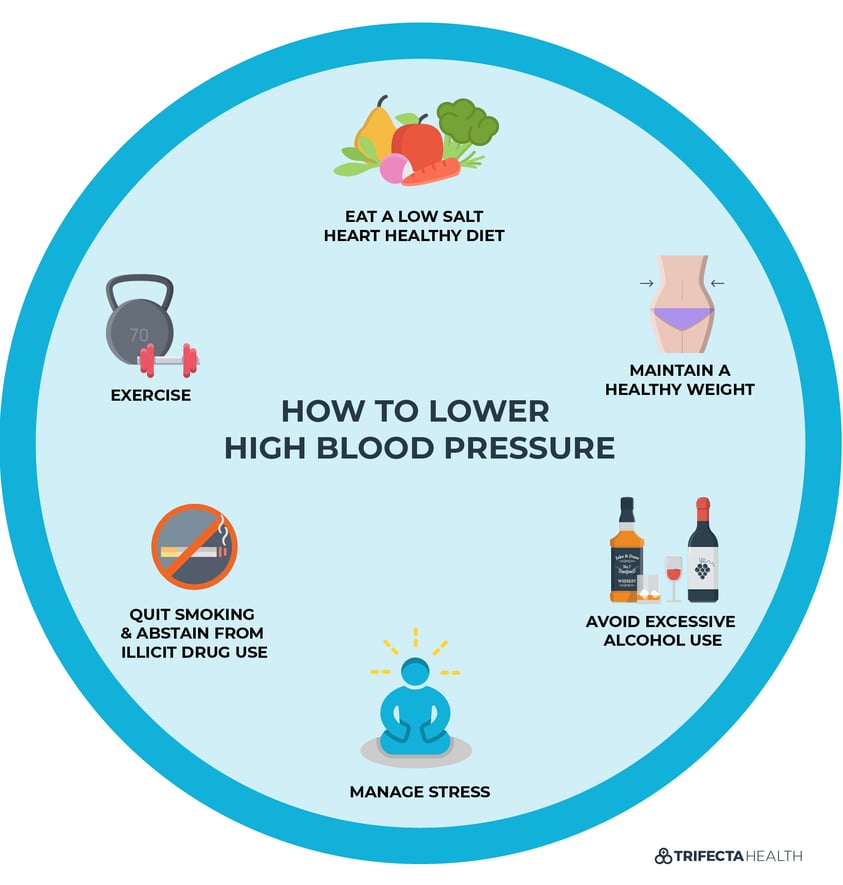A whopping 1 out of every 3 American’s have high blood pressure. And only half of these people are actually keeping it under control (1).
Called the silent killer, hypertension is a major risk factor for many deadly health problems including stroke, kidney disease, heart attack, and heart failure.
This high blood pressure guide will take you step by step through what causes hypertension, it's complications and how to prevent and control it.
What is High Blood Pressure?
You’re probably familiar with two numbers when hearing about blood pressure.
High Blood Pressure Numbers
The top number is called the systolic pressure and represents the force of blood when the heart is squeezing when pressures are highest . It is therefore also always the highest number.
The bottom number is called the diastolic pressure. It is a measure of pressure when the heart is relaxing and refilling - and is therefore the lowest number.

Hypertension Definition
Hypertension is a fancy word for people that have consistently high blood pressure.
Essential hypertension (aka primary hypertension) is high blood pressure without any other known cause.
But what does this mean? Our heart pumps blood throughout our body to deliver precious oxygen and nutrients to each organ. Blood pressure is a measure of the force of blood on the vessels transporting it.
If blood pressure is too low there may not be enough force to reach all of the organs. If it is consistently too high it can cause many dangerous consequences for all parts of the body over time.
We want a ‘goldilocks’ blood pressure - one that is just right to best support the need of our body.
Stage 1 Hypertension
Stage 1 hypertension is a mild form of the disease - defined as a systolic pressure (top number) 130-139 and a diastolic pressure (bottom number) 80-89.
Stage 2 Hypertension
More advanced disease is called stage 2 hypertension. This is defined as a systolic pressure (top number) greater than 140 and/or a diastolic number (bottom number) greater than 90.

White Coat Hypertension
Some people with normal blood pressure have high readings only when they’re at the doctors office. This can be from stress, anxiety or pain.
If you’ve had a single high blood pressure reading, it doesn’t necessarily mean that you have hypertension.
However, it is also extremely important to not just ignore it.
Diagnosing Hypertension
It's recommended to take your blood pressure when you’re relaxed and in an environment that is comfortable for you. This could be at your home, while shopping or at a convenient store.
Diagnosing hypertension involves taking your blood pressure at three separate times on different days when you're in this relaxed state.
Consistently elevated blood pressure in these relaxed situations solidifies the diagnosis of hypertension.
High Blood Pressure in Pregnancy (Gestational Hypertension)
Gestational hypertension is high blood pressure that develops in pregnancy during or after the second trimester and goes away once the baby is delivered. This can be particularly dangerous for both the fetus (baby) and the mother.
These women are at increased risk for a dangerous condition called pre-eclampsia. It can also create risks for the baby she is carrying by preventing enough blood flow to the fetus - in a condition called placental insufficiency.
Women with gestational hypertension are monitored more frequently and may require medications to help control their symptoms.

High Blood Pressure Symptoms
The scary part about blood pressure is that it most often presents without any symptoms - until it causes often irreversible and sometimes life threatening damage.
While some people experience nonspecific symptoms like headaches and lightheadedness most people won’t feel any differently with high blood pressure. This is a huge argument for getting regular doctor check ups to make sure silent and preventable disease aren’t sneaking up on you.
High Blood Pressure Complications
When blood pressure is too high for too long almost any organ in your body can suffer irreversible damage. Common long term consequences of high blood pressure include:
- Heart Failure (hypertensive heart disease)
- Vision Problems (retinopathy)
- Kidney Problems (nephropathy)
- Peripheral Vascular Disease (poor wound healing, amputations)
- Brain Problems (stroke)
Hypertensive Emergencies
While many of the devastating effects from hypertension occur slowly over time, life threatening emergencies from high blood pressure are also relatively common.
The more uncontrolled the blood pressure is, the higher the risk is of one of these life changing events. This is also sometimes called a hypertensive crisis.
1) Cardiovascular Emergencies (Heart Attack & Aortic Dissection)
Hypertension is a strong risk factor for heart attacks (aka: acute coronary syndrome). It also is the biggest risk factor for a relatively uncommon but deadly conditional called aortic dissection.
Your aorta is the largest artery in your body traveling from your chest through your abdomen and pumps a tremendous amount of blood at high forces to the rest of your organs. When blood pressure is too high for too long, this vessel can be torn - and is life threatening even with the best care.
2) Stroke
There are two main types of stroke: bleeding into the brain (hemorrhagic stroke) and not enough blood getting to parts of the brain (ischemic stroke). Hypertension is a huge risk for both types of stroke.
Like all of these conditions - decreasing blood pressure overtime helps to prevent strokes from happening.
3) Hypertensive Encephalopathy
In states of exceptionally elevated blood pressure, some people become very confused and can even go into a coma. This requires aggressive treatment in the hospital.
4) Kidney Failure
While hypertension can cause progressive kidney damage, acute kidney failure can occur in a hypertensive emergency. While this may be reversible if treated correctly, it can lead to life threatening electrolyte abnormalities and permanent kidney damage sometimes requiring dialysis.
5) Pulmonary Edema
When the heart is overworked and blood pressure continues to rise, fluid can back up and ‘flood’ the lungs in a condition called ‘flash pulmonary edema’. This awful state makes people feel like they’re drowning - and in a sense they are as fluid is filling their lungs. Like all of these emergencies, flash pulmonary edema can be life threatening if not treated quickly and effectively.

What Causes High Blood Pressure
There are many factors that may contribute to high blood pressure. Luckily, the major causes of hypertension are within our control to change.
1) High Blood Pressure Diet
Diet probably has the largest impact on the development of high blood pressure for most people as it controls both salt intake and weight management.
Eating too much salt is a major contributor to hypertension. Many well done studies demonstrate that decreasing salt intake lowers blood pressure and increasing salt intake elevates blood pressure (2, 3)
Regardless of what is causing your hypertension, significantly reducing the salt you consume can help it.
2) Obesity
Being overweight may contribute to nearly half of all cases of hypertension (4). And it’s well established that weight loss significantly contributes to lowering blood pressure and weight gain contributes to elevating it.
What’s more is that these effects are progressive - the more weight you put on the higher your blood pressure is likely to be, and the more weight you lose the more your blood pressure is likely to normalize. Compounding factors even further, obesity contributes to many other comorbid disease including high cholesterol, heart disease and atherosclerosis.
3) Sedentary Lifestyle
Inactivity increases the risk of hypertension. Becoming more physically active decreases high blood pressure probably both through its contribution to weight loss and by its own independent means (5).
4) Genetics & Ethnicity
Hypertension does seem to be hereditary and more predominant in certain ethnicities including African Americans. But this doesn’t mean that you are stuck with high blood pressure just because your parents are.
While you may be at higher risk for the disease than other people, careful weight management, low salt intake and an active lifestyle can often keep hypertension under control.
5) Age
As we get older, our risk of hypertension rises. In fact, it’s expected that as many as 90% of all people will eventually develop hypertension as they age (6).
6) Smoking
Cigarette smoking (both by primary or second hand exposure) is shown to increase the risk of high blood pressure.
7) Alcohol Use
While mild to moderate alcohol consumption has been linked to lower blood pressure, consistent heavy alcohol abuse is associated with higher rates of hypertension.
Other Factors that Cause High Blood Pressure
8. Medications (including over the counter, supplements and prescription)
9. Kidney Disease
10. Endocrine Diseases (ie: Cushing's Syndrome)
11. Sleep Apnea
12. Illicit Drug Use
How to Lower High Blood Pressure
Learning how to manage high blood pressure is critical to preventing these devastating consequences. The right lifestyle modifications can significantly influence, and often cure hypertension.
What can you do in your daily life to keep hypertension under control?
- Eat a Low Salt Heart Healthy Diet
- Maintain a Healthy Weight
- Exercise
- Quit Smoking & Abstain from Illicit Drug Use
- Manage Stress
- Avoid Excessive Alcohol Use
- Take Medications as Prescribed
Read this article for details on how to lower high blood pressure.